 |
Statistics :
11630 Movies
19215 People
1448 Studios
29 Articles
73 Interviews
12 DVD Reviews
32452 Screenshots
3722 Videos
|
|
 |
 |
Opinions about HK/Chinese Cinema |
1/1 - Page 3 |
 |
 |
 |
 |
 |
|

|
 HKCinemagic :
What makes HK films interesting in your opinion? HKCinemagic :
What makes HK films interesting in your opinion? |
| Paul Fonoroff : I think the whole concept that Hong Kong could have such a huge movie culture with such a far-reaching influence. Of course, it’s not the same now, and it's ironic that now that the world has discovered Hong Kong movies, the local movie business has really gone downhill in its home territory. But if you talk to people from Southeast Asia or from Taiwan, they really grew up watching Hong Kong movies. It’s hugely influential. It just fascinated me that in such a tiny place, in the early
1960s, there could be over 300 movies made each year. And the Hong Kong movie influence has gone global in recent years -- just look at the way Hong Kong-style action has been adopted by Hollywood. In a way, I don’t know if it’s a really good influence, for someone like me who is more script oriented. |
| |
 HKCinemagic : During the
1950s-60s, there was a big difference between Cantonese and Mandarin productions. Which ones do you prefer? HKCinemagic : During the
1950s-60s, there was a big difference between Cantonese and Mandarin productions. Which ones do you prefer? |
| Paul Fonoroff : In the old days, when I first came to Hong Kong, I would have said Mandarin but it’s because I didn’t know much about Cantonese films back then. A lot of Cantonese films were cheap productions and some of the actors would be in 40 films in one year! But as I watched more Cantonese movies, I realized that a lot of these movies have a character
on their own. Mandarin films tended to have bigger budgets but you also had lousy, low budget Mandarin films, and some lousy high budget Mandarin movies as well. So which are my
favorites? Hard to say, but if I have to make a choice, I guess I'd go with Mandarin movies from the 1950s. They were made in this Shanghai tradition that I like. And I'm a big fan of some of the Mandarin movie stars. |
| |
 HKCinemagic : The re-release of Shaw Brothers and Cathay titles has been much discussed before it happened. And it was quite a success in the West. But it doesn’t seem to have made a big impact here, in Hong Kong. Why
that? HKCinemagic : The re-release of Shaw Brothers and Cathay titles has been much discussed before it happened. And it was quite a success in the West. But it doesn’t seem to have made a big impact here, in Hong Kong. Why
that? |
| Paul Fonoroff :
I’m unaware of what the reactions have been. I don’t think they released them in a very smart or meaningful way. They kind of dumped them on the market and if you knew about them, you would go and buy them, but if you didn’t, they didn’t do anything to make people want to explore them. Truth be told, in the Shaws DVD library, there are about 750 titles
[Ed.: digitally restored, but the collections contains more than 1000
titles], but how many are good? Not too many. If you take Chang Cheh,
he made some good movies but also many lousy ones. So, a lot of the quality
really isn’t there. If we’re talking about the must-see films, if there are
50 among those 750, I think it’s already a lot.
After all, they were just churning them out, especially on the 1970s.
They had a formula and would use it until no one wanted to see them any
more. It's part of the reason there are so few gems among all those DVD
releases. They should released the DVDs in a way which would strengthen
interest among potential viewers. Like what we did in TV shows we used to
make, especially in the nostalgia segments. But the DVD distributors didn’t
do that. For a while, they tried to have some interesting special features
and gave up on that too. What’s the use of buying an expensive disc if you
don't get any extras? Otherwise, you can just buy pirated discs. Because
pirates don’t bother to copy the extras. With very interesting extras, it
could be a motivation to buy even the lousy movies.
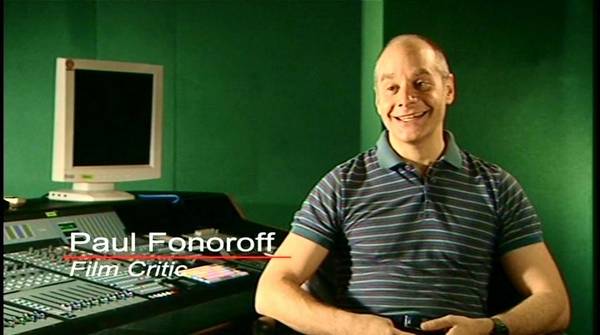
Interview for the extra of The Warlord
|
| |
 HKCinemagic : Did you enjoy the experience of doing audio commentary for some of those titles? HKCinemagic : Did you enjoy the experience of doing audio commentary for some of those titles? |
| Paul Fonoroff : Oh, sure! I would have loved to do more. It depends who I was partnered with to do the commentaries. Some were very knowledgeable, some were not. |
| |
 HKCinemagic : Do you think about Josie Ho? HKCinemagic : Do you think about Josie Ho? |
| Paul Fonoroff : Josie Ho was ok, and very nice to work with. Another lady, who shall remain nameless, didn't even bother to look at the film in advance of doing the commentary. |
| |
 HKCinemagic : Where did the idea to pair you with famous actresses came from? HKCinemagic : Where did the idea to pair you with famous actresses came from? |
| Paul Fonoroff : From the head of the production company in charge of the commentaries. A Chinese American guy. It's a good idea in theory, since these celebrities' names might help sell the product.… But the ones we did with Peter Chik [former head of the Hong Kong International Film Festival] was great, and so was the one with Lawrence Ah Mon. He was a classmate of mine at USC before becoming a director in Hong Kong. He actually went to the trouble of reading the book that was the basis of the movie we commented on, as part of his preparation for the commentary. That's what I call responsible.
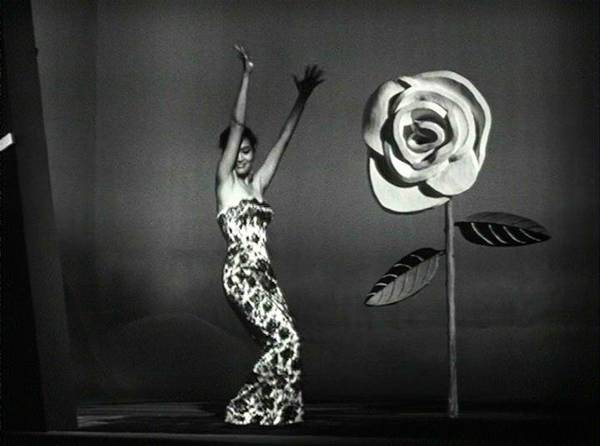
Wild Wild Rose |
| |
 HKCinemagic : If someone wants to discover movies from the Cathay or Shaw Brothers, which movies would you advise? HKCinemagic : If someone wants to discover movies from the Cathay or Shaw Brothers, which movies would you advise? |
| Paul Fonoroff : Unfortunately, a lot of the great Shaw Brothers no longer exist… or at least the ones I think might be great, as I haven’t seem them myself, obviously. I made a list once, of the missing Shaw Brothers films, and there were around 180 titles. Most of them black and white. If I was just beginning to watch those movies and wanted a good sampler, I would say, as far as Cathay is concerned,: Mambo Girl; Wild, Wild Rose or Our Sister Hedy. For Shaw Brothers, I think that The Kingdom and the Beauty is a must to discover Huangmei Diao [a type of traditional folk musical], Love Without End, Come Drink With Me -- I think this one is one of the best action movies ever, a really wonderful movie.
There are some other films which are famous but I don’t find very good, like Cathay's Sun, Moon And Star. When I saw it back in the 1970s, I thought Enchanting Shadow was quite good but I haven’t seen it in years. And of course The Warlord and other Li Han Hsiang films. And there are some cute films like The Battle of Love with Linda Lin Dai, made in the late
1950s. I can't say I really like some of the more famous ones, like Hong Kong Nocturne. It’s ok and some scenes are pure camp, but it's not a very good movie. There were better musicals done earlier.
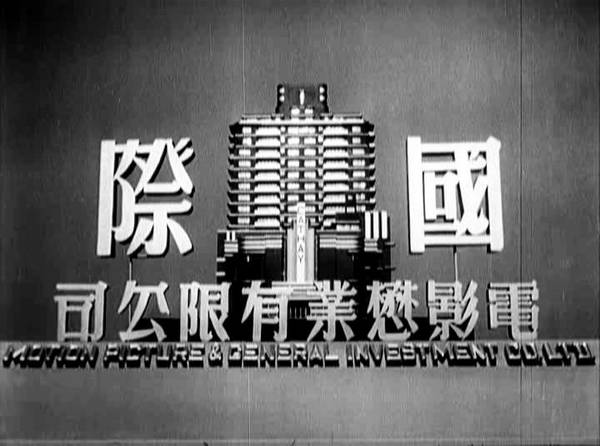
The Motion Picture & General Investment company
(MP&GI), before it changed its name into Cathay |
| |
 HKCinemagic : Your own sensibility
leans more towards the Cathay than the Shaw Brothers films? HKCinemagic : Your own sensibility
leans more towards the Cathay than the Shaw Brothers films? |
| Paul Fonoroff : Yes. Maybe because I’ve seen more of them. Most of the Shaw Brothers stuff that they have released is post 1960, so the 1950s stuff from Cathay is more accessible. And they had a very high quality at that time. Cathay movies after
1964 can be pretty bad. After the boss [Loke Wan To] died in an air crash. The
1950s and early 1960s was a golden period, and the same might be true for Shaws, but they don't have much from that period anymore. They only preserved a few of the older films and the rest is lost forever. It’s quite frustrating because you can see the scripts, the stills, but not the films. And we are not talking about silent films, they are just from the
1960s, for God's sake! |
| |
 HKCinemagic :
In your opinion, what time was the golden age of Hong Kong cinema? HKCinemagic :
In your opinion, what time was the golden age of Hong Kong cinema? |
| Paul Fonoroff : In terms of the number of productions, I guess it was the late
1980s/early 1990s, from A Better Tomorrow till
1992-1993. But not in terms of quality. Because people got greedy, actors were making
four to five movies at the same time. How can you make a good job in those conditions? It’s quite irresponsible. |
| |
 HKCinemagic : The triads probably didn’t help either. HKCinemagic : The triads probably didn’t help either. |
| Paul Fonoroff :
It might have had something to do with it, yes, but I think it all came down to greediness and taking the local audience for granted. In terms of quality, I have not seen enough films from the past to really make a totally informed decision, but from what I’ve seen, I really like the early
1950s. There was a certain spirit, a nice mixture of Shanghai talent who had moved south to escape the Communists, along with the local Cantonese directors and scriptwriters who were happy to be making movies again after the destruction of the Japanese occupation during World War II. And they made so many wonderful movies.
Now, there is too much emphasis put on trying to conquer the Mainland Chinese market and so the old Hong Kong
flavor is being diluted. Things like Perhaps Love. I thought it was just dreadful. That the same director who did Comrades, Almost a Love Story, which I think is a wonderful movie, certainly in the top 10 of the films that have been made in the last 20 years, that somebody who could make something so sensitive could turn around and make something so overblown as Perhaps Love puzzles me. I don’t know what to expect from his next one [The Warlords]. |
| |
 HKCinemagic : Derek Yee’s movies remain very good. HKCinemagic : Derek Yee’s movies remain very good. |
| Paul Fonoroff : Yes, he’s almost the only one left who tries to elevate mainstream genres on a regular basis. Gordon Chan had that quality
ten years ago but it’s not longer there. He seems to have lost it, but one time he had it. Brief Encounter in Shinjuku, Fight Back to School, Fist of Legend -- there was too much action in this one but it was intelligently done. |
| |
 HKCinemagic : We've already talked a bit
about it but, in your opinion, what was the reason of the decline of the
film industry after 1992-1993? HKCinemagic : We've already talked a bit
about it but, in your opinion, what was the reason of the decline of the
film industry after 1992-1993? |
| Paul Fonoroff : It’s a combination of factors of course. They just produced so many bad films that shouldn’t have made it to theatres that people began to stay away from theatres. And at the same time, there was the development of other formats like DVDs, VCDs. Property prices escalated so much in the
1990s that prices for everything went up as well, including movie tickets and movie budgets. And with tickets so expensive, many cinema-goers began being more selective when it came to going to the cinema, especially since they could watch the same movie at home for a much cheaper price.
So many of the movies in the 1990s were the same. They overproduced. If there was a popular genre, everybody would jump on the bandwagon until it got to a point where there was no bandwagon to jump on. Eventually, producers didn’t know what kind of material people wanted to see. It had the result that we now have more variety in terms of subject matter, which is good, but the local industry really lost its base audience and never got them back.
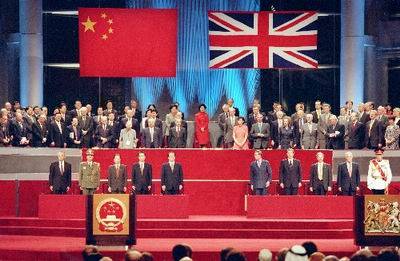
Official handover ceremony in 1997
|
| |
 HKCinemagic : What do you think about the impact of the handover? Many critics
consider it was also an important factor. HKCinemagic : What do you think about the impact of the handover? Many critics
consider it was also an important factor. |
| Paul Fonoroff : Not so much. Of course, everything affects everything. But I don’t think it had so much effect. As for the handover itself, even though it was such an important event, nobody made a meaningful movie about it. Nobody. When the topic was dealt with on film, it was always in a very superficial way or in the background. You would think that with hundreds of movies produced in the years before and after the handover, there would be at least one which would talk about the most meaningful event of Hong Kong's recent history in a meaningful manner (laughs).
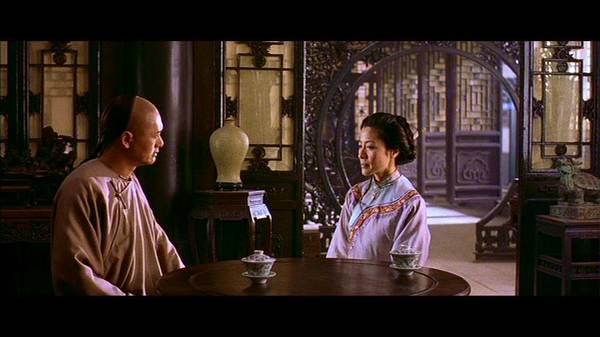
Chow Yun Fat and Michelle Yeoh in Crouching Tiger Hidden Dragon
|
| |
 HKCinemagic : What do you think about the career evolution of some Hong Kong talents who have left for the west, like Chow Yun Fat? HKCinemagic : What do you think about the career evolution of some Hong Kong talents who have left for the west, like Chow Yun Fat? |
| Paul Fonoroff : I think his post Hong Kong career has been handled so poorly. He’s an actor who is really a great star and a great actor. And he has a great personality too. He can do any kind of role convincingly. From comedy, romance, to being a ruthless killer… He can do everything! And yet, when he was in Hollywood, they put him in those lousy, lousy movies. And he finally has a hit doing a Chinese movie! And in a dialect he’s not very good in… I didn’t feel comfortable watching him in Crouching Tiger, Hidden Dragon, the same for Michelle Yeoh, their dialogue was not delivered very well because they're not entirely comfortable speaking in Mandarin. And having been in a somewhat similar situation -- not that any of my so-called performances can in any way approach anything even near their standard, I can understand how they were on auto pilot from
memorizing all that dialogue. But as far as Chow Yun Fat's usual Hollywood films are concerned, I've been very disappointed to see him in those very stereotypical roles. If you didn’t know what he had done before, you would have no idea that he is actually a great actor.
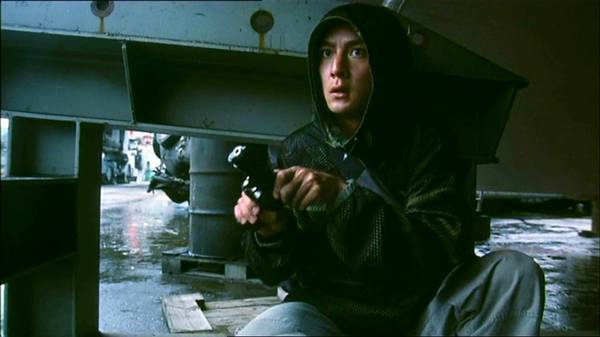
Daniel Wu in Purple Storm
|
| |
 HKCinemagic : Do you see any HK actor who would have a potential to make it in the west? HKCinemagic : Do you see any HK actor who would have a potential to make it in the west? |
| Paul Fonoroff : It depends on what kind of roles, but there are so many HK actors now who come from the US or Canada and speak perfect English. It’s hard to judge Hong Kong actors as they are used in such lousy films, so you don’t really know what they are capable of. Look at Edison Chen, he has shown hints of being capable of good performances when he’s not just asked to be a teen idol. And his English is absolutely perfect, even better than his Chinese. Nicholas Tse, another English speaker who I think is probably a good actor. He has been good in some movies. Daniel Wu’s very hard working, I’m still not convinced he’s a brilliant actor but he’s so hard working that he has had a brilliant career. I think of him as the last Hong Kong movie star. I don’t think anybody coming after him will be able to have the career he's managed to have. In this period of decline, he has been able to be in so many movies, with all the big directors. But I don’t know what Hollywood would do with them. Characters actors have more chance. People like Anthony Wong... |
|
|
| |
 |
|
|
Page :
1
2
3
Top
|
|
|
|
|
|
|
 |
